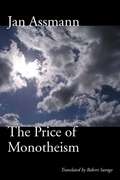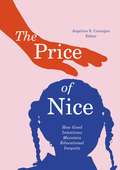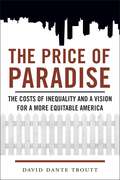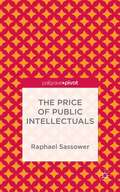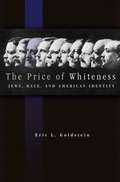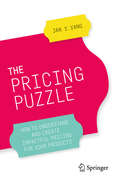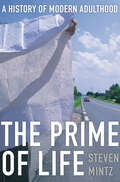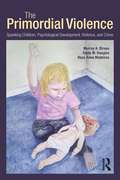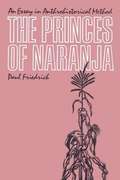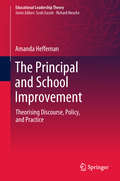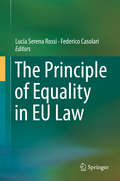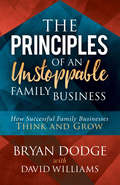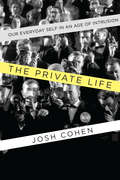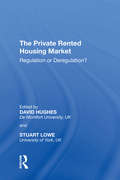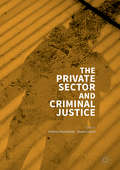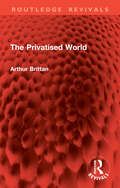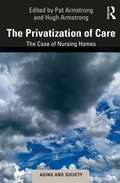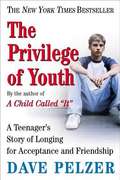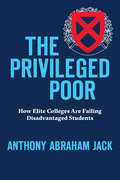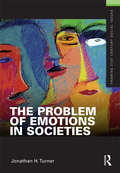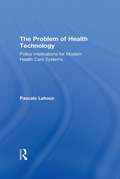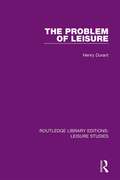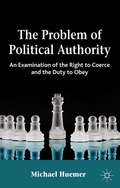- Table View
- List View
The Price of Monotheism
by Jan Assmann Robert SavageSometime between the late Bronze Age and late antiquity, depending on which professor is professing, a shift took place that has had a more profound impact on human and world history than any political upheaval, says Assamann (emeritus Egyptology, U. of Heidelberg. Germany). That was the shift from polytheistic to monotheistic religion, from cult religions to religions of the book, from culturally specific religions to world religions. He details that change, examining the costs and benefits both immediately and ultimately. Among his topics are the Mosaic distinction and the problem of intolerance, what monotheism countered, between idolatry and iconoclasm, Sigmund Freud and progress in intellectuality, and the psycho-historical consequences of monotheism. There is no index. Die Mosaische Unterscheidung oder der Preis des Monotheismus was published by Carl Hanser Verlag in 2003. Annotation c2010 Book News, Inc. , Portland, OR (booknews. com)
The Price of Nice: How Good Intentions Maintain Educational Inequity
by Angelina E. CastagnoHow being &“nice&” in school and university settings works to reinforce racialized, gendered, and (dis)ability-related inequities in education and society Being nice is difficult to critique. Niceness is almost always portrayed and felt as a positive quality. In schools, nice teachers are popular among students, parents, and administrators. And yet Niceness, as a distinct set of practices and discourses, is not actually good for individuals, institutions, or communities because of the way it maintains and reinforces educational inequity. In The Price of Nice, an interdisciplinary group of scholars explores Niceness in educational spaces from elementary schools through higher education to highlight how this seemingly benign quality reinforces structural inequalities. Grounded in data, personal narrative, and theory, the chapters show that Niceness, as a raced, gendered, and classed set of behaviors, functions both as a shield to save educators from having to do the hard work of dismantling inequity and as a disciplining agent for those who attempt or even consider disrupting structures and ideologies of dominance. Contributors: Sarah Abuwandi, Arizona State U; Colin Ben, U of Utah; Nicholas Bustamante, Arizona State U; Aidan/Amanda J. Charles, Northern Arizona U; Jeremiah Chin, Arizona State U; Sally Campbell Galman, U of Massachusetts; Frederick Gooding Jr., Texas Christian U; Deirdre Judge, Tufts U; Katie A. Lazdowski; Román Liera, U of Southern California; Sylvia Mac, U of La Verne; Lindsey Malcolm-Piqueux, California Institute of Technology; Giselle Martinez Negrette, U of Wisconsin–Madison; Amber Poleviyuma, Arizona State U; Alexus Richmond, Arizona State U; Frances J. Riemer, Northern Arizona U; Jessica Sierk, St. Lawrence U; Bailey B. Smolarek, U of Wisconsin–Madison; Jessica Solyom, Arizona State U; Megan Tom, Arizona State U; Sabina Vaught, U of Oklahoma; Cynthia Diana Villarreal, U of Southern California; Kristine T. Weatherston, Temple U; Joseph C. Wegwert, Northern Arizona U; Marguerite Anne Fillion Wilson, Binghamton U; Jia-Hui Stefanie Wong, Trinity College; Denise Gray Yull, Binghamton U.
The Price of Paradise: The Costs of Inequality and a Vision for a More Equitable America
by David Dante TrouttAmerican communities are facing chronic problems: fiscal stress, urban decline, environmental sprawl, mass incarceration, political isolation, disproportionate foreclosures and severe public health risks. In The Price of Paradise, David Troutt argues that it is a lack of mutuality in our local decision making that has led to this looming crisis facing cities and local governments. Arguing that there are structural flaws in the American dream, Troutt investigates the role that place plays in our thinking and how we have organized our communities to create or deny opportunity. Legal rules and policies that promoted mobility for most citizens simultaneously stifled and segregated a growing minority by race, class and—most importantly—place. A conversation about America at the crossroads, The Price of Paradise is a multilayered exploration of the legal, economic and cultural forces that contribute to the squeeze on the middle class, the hidden dangers of growing income and wealth inequality and the literature on how growth and consumption patterns are environmentally unsustainable.
The Price of Public Intellectuals
by Raphael SassowerThis book provides a historically-informed survey critically outlining sociological, psychological, political, and economic approaches to the role of public intellectuals. Sassower suggests how the state might financially support the essential work of public intellectuals so as to critically engage the public and improve public policies.
The Price of Whiteness: Jews, Race, and American Identity
by Eric L. GoldsteinWhat has it meant to be Jewish in a nation preoccupied with the categories of black and white? The Price of Whiteness documents the uneasy place Jews have held in America's racial culture since the late nineteenth century. The book traces Jews' often tumultuous encounter with race from the 1870s through World War II, when they became vested as part of America's white mainstream and abandoned the practice of describing themselves in racial terms. American Jewish history is often told as a story of quick and successful adaptation, but Goldstein demonstrates how the process of identifying as white Americans was an ambivalent one, filled with hard choices and conflicting emotions for Jewish immigrants and their children. Jews enjoyed a much greater level of social inclusion than African Americans, but their membership in white America was frequently made contingent on their conformity to prevailing racial mores and on the eradication of their perceived racial distinctiveness. While Jews consistently sought acceptance as whites, their tendency to express their own group bonds through the language of "race" led to deep misgivings about what was required of them. Today, despite the great success Jews enjoy in the United States, they still struggle with the constraints of America's black-white dichotomy. The Price of Whiteness concludes that while Jews' status as white has opened many doors for them, it has also placed limits on their ability to assert themselves as a group apart.
The Pricing Puzzle: How to Understand and Create Impactful Pricing for Your Products
by Jan Y. YangThe price of virtually any product or service can reveal intriguing stories. The author looks back at his own decade-long pricing journey and shares some of the most exciting and insightful pricing stories, allowing readers to see the world from a different angle. From pricing a chilled Coke in Tehran, to iPhone, to explaining the fall of MUJI, this book reveals the rationales behind and outcomes of various pricing strategies. The author also presents a number of stories from China, a "price wonderland" in which he, both as a consumer and a pricing consultant, has observed unconventional pricing practices rarely found elsewhere, such as the frequent use of negative prices among tech unicorns, i.e., sellers paying consumers to use their products. Structured as a collection of short stories, the book offers a delightful and eye-opening reading experience for business owners, managers, and anyone interested in understanding what prices are, and how pricing works and interacts with us as customers.
The Pricing of Progress: Economic Indicators and the Capitalization of American Life
by Eli CookHow did Americans come to quantify their society’s well-being in units of money? In our GDP-run world, prices are the measure of not only goods and commodities but our environment, communities, nation, even self-worth. Eli Cook shows how, and why, we moderns lost sight of earlier social and moral metrics that did not put a price on everyday life.
The Prime of Life: A History of Modern Adulthood
by Steven Mintz&“By drawing on 400 years of social and economic history . . . [the book] presents a thoughtful and thorough guide through the life stages.&” (Library Journal) Adulthood today is undergoing profound transformations. Men and women wait until their thirties to marry, have children, and establish full-time careers, occupying a prolonged period in which they are no longer adolescents but still lack the traditional emblems of adult identity. People at midlife struggle to sustain relationships with friends and partners, to achieve fulfilling careers, to raise their children successfully, and to age gracefully. The Prime of Life puts today&’s challenges into new perspective by exploring how past generations navigated the passage to maturity. Whereas adulthood once meant culturally-prescribed roles and relationships, the social and economic convulsions of the last sixty years have transformed it fundamentally, tearing up these shared scripts and leaving adults to fashion meaning and coherence in an increasingly individualistic culture. Emphasizing adulthood&’s joys and fulfillments as well as its frustrations and regrets, Mintz shows how cultural and historical circumstances have consistently reshaped what it means to be a grown up in contemporary society. &“A triumph of historical writing.&” ―The Spectator &“[Mintz&’s] message―that there are many ways to wear the mantle of responsible adulthood and that the 1950s model is a mere blip on history&’s radar―is deeply necessary and long overdue.&” ―New York Times Book Review &“Describing the cultural, economic, and social changes from the Colonial era to today&’s world . . . Mintz argues that neither religious nor secular middle-class values are adequate responses to the new generation&’s problems.&” —Choice &“A thoughtful and strangely encouraging tour of an often difficult life stage.&” ―Kirkus Reviews
The Primordial Violence: Spanking Children, Psychological Development, Violence, and Crime
by Emily M. Douglas Murray A. Straus Rose Anne MedeirosA CHOICE Outstanding Academic Title 2014! Why do parents hit those they love? What effect does it have on children? What can be done to end this pattern? These are some of the questions explored in The Primordial Violence. Featuring longitudinal data from over 7,000 U.S. families as well as results from a 32 nation study, the book presents the latest research on the extent to which spanking is used in different cultures and the subsequent effects of its use on children and on society. Evidence that shows the relationship between spanking and the subsequent slowing of cognitive development and increase in antisocial and criminal behavior is shown. Both cross-sectional and longitudinal studies are explored in an accessible fashion. An abundance of high quality research has produced findings that are highly consistent from study to study which show that spanking is a risk factor for aggressive behavior and other social and psychological problems. Because of these findings, the authors argue for policy changes and recommend a drastic reduction in the use of spanking. Policy and practical implications are explored in most chapters. The Primordial Violence highlights: The benefits of avoiding spanking such as the development of better interpersonal skills and higher academic achievement; The link between spanking and behavioral problems and crime; The extent to which spanking is declining and why despite the unusually high level of agreement between numerous studies which found harmful effects from spanking, most parents continue to spank. Part 1 documents the worldwide use of spanking and why parents spank. The possible adverse effects of spanking on children’s behavior and academic achievement, and the potential for violence and criminal behavior in later life, are explored in Parts 2, 3, and 4. Part 5 examines trends in spanking, and suggests what can be done to lower the percent of parents who spank. Contradictory opinions about whether to spank are explored. The book concludes with a call for change in this aspect of parenting which will have profound benefits, for the children and families involved, and society as a whole. Intended for a general audience of readers who are interested in child development and parenting and for advanced undergraduate and/or graduate courses in child abuse, family violence, juvenile delinquency, criminal behavior, social development, sociology of the family, or parenting and family relations taught in psychology, human development, family studies, criminology, education, social work, sociology, and social policy.
The Princes of Naranja: An Essay in Anthrohistorical Method
by Paul FriedrichIn this groundbreaking study, Paul Friedrich looks closely at the strong men of the Tarascan Indian village of Naranja: their leadership, friendship, kinship, and violent local politics (over a time depth of one generation), and ways to understand such phenomena. What emerges is an acutely observed portrait of the men who form the very basis of the grass-roots power structure in Mexico today. Of interest to historians, sociologists, and political scientists, as well as Latin Americanists and anthropologists, The Princes of Naranja is a sequel to Friedrich's now classic Agrarian Revolt in a Mexican Village. It begins with biographical character studies of seven leaders-peasant gunmen, judges, politicos; here the book will grip the reader and provoke strong emotional response, from laughter to horror. A middle section places these "princes" in relation to each other, and to the contexts of village society and the larger entities of which it forms a part. Friedrich's synthesis of anthropology, local (mainly oral) history, macrohistory, microsociology, psychology, and literature gives new insight into the structure of Mexican politics from the local level up, and provides a model for other scholars doing analogous work in other parts of the world, especially in the developing world. The concluding section raises vital questions about the dynamic relations between the fieldworker, fieldwork, field notes, the villagers, the writing of a fieldwork-based book, and, implicitly, the audience for such books.
The Principal and School Improvement: Theorising Discourse, Policy, and Practice (Educational Leadership Theory)
by Amanda HeffernanThis book investigates the localised effects of reform by exploring the impact of a school improvement policy agenda on the work of three experienced principals. It presents three longitudinal case studies within a shared specific leadership context in Queensland, Australia. The case studies enable an exploration of the way the principalship in this context has evolved over time, providing deep insights into the practices and beliefs of three experienced school leaders working in a period of rapid and urgent systemic reform. The nature of global reform policy borrowing means that the research and the findings within this monograph are relevant for international audiences.The book describes a new way to understand and theorise the effects of reform policies and associated pressures on school leaders. Using post-structural theory, it provides a better understanding of the specific effects of reform policy ensembles, particularly when combined with an analysis of the ways policy and discourse work together at a wider level to create an environment that disciplines the principalship. Further, it sheds lights on the means of complying with or contesting policy influences and how the work of leaders has changed over time.
The Principle of Equality in EU Law
by Lucia Serena Rossi Federico CasolariThis book provides a comprehensive and updated legal analysis of the equality principle in EU law. To this end, it argues for a broad definition of the principle, which includes not only its inter-individual dimension, but also the equality of the Member States before the EU Treaties. The book presents a collection of high-quality academic and expert contributions, which, in light of the most recent developments in implementing the post-Lisbon legal framework, reflect the current interpretation of the equality principle, examining its performance in practice with a view to suggesting possible solutions in order to overcome recurring problems. To this end the volume is divided into three Parts, the first of which addresses a peculiar aspect of the EU equality that is mostly overlooked in the investigations devoted to this topic, namely, equality among States. Part II shifts to the inter-individual dimension of equality and explores some major developments contributing to (re)shaping the global framework of EU anti-discrimination law, while Part III undertakes a more practical investigation devoted to the substantive strands of that area of EU law.
The Principles of an Unstoppable Family Business: How Successful Family Businesses Think and Grow
by David Williams Bryan DodgeThe Principles of an Unstoppable Family-Business is all about building a family-based business on a set of specific principals that are absolutely necessary for it to survive. It&’s an enormous challenge to be in business with kin and actually make it work. Family-business consultant Bryan Dodge goal is to provide the best practices and key elements needed for a solid foundation. It&’s all about making something very challenging into something very rewarding with this go-to resource for understanding the key concepts behind a successful family-business.
The Private Life: Our Everyday Self in an Age of Intrusion
by Josh CohenWith social networking and reality television, self-help columns and daytime talk shows, there's an infinite array of platforms to both expose our deepest thoughts and examine the thoughts of others. In this age of non-stop communication, one's privacy is subject to unrelenting examination, intrusion, and attack from the media, the government, friends, family, and complete strangers.So what are we trying to hide? And what are we trying to find out about others? Practicing psychoanalyst and professor of literature Josh Cohen tackles those questions in his study of privacy and personality, the "most vulnerable and indestructible region of your self." Using Sigmund Freud's theories on identity and the ego as a foundation, Cohen weaves through time and place to study an extensive variety of people who unearthed and revealed the rawest form of their selves. From Adam and Eve to the ballerinas in the hit 2010 film Black Swan, from Hester Prynne to British celebrity Katie Price, Cohen finds Freud's ideas in both fiction and reality alike.Yet even with all the times that we've exposed the inner workings of our psyches, Cohen is sure to emphasize that some part of every individual will always remain hidden. Like Freud once wrote, "The ego is not master in its own house." In a culture that floods our lives with light, how is it that we remain so helplessly in the dark?
The Private Rental Sector in Australia: Living with Uncertainty
by Alan Morris Hal Pawson Kath HulseThis book explores the decline and growth of the private rental sector in Australia delving into the changing dynamics of landlord investment and tenant profile over the course of the twentieth century and into the present period. It explains why over one in four Australian households are now private renters and investigates the contemporary legal and regulatory frameworks governing the sector. The reform discourses in Australia and comparator countries, and debates around key concerns such as Australia’s advantageous tax treatment of investors in rental property and the power imbalance between tenants and landlords are highlighted. The book draws on rich data: 600 surveys and close to 100 in-depth interviews with tenants in high, medium and low rent areas in Sydney and Melbourne and regional New South Wales. The book provides in-depth insights into this large and expanding component of Australia’s housing market and shows how being a private renter shapes the everyday lives and wellbeing of people and households who rent their housing including short and long-term renters, those on low and higher incomes and older as well as younger people.
The Private Rented Housing Market: Regulation or Deregulation?
by Stuart LoweThe privately rented housing market has largely catered for young, mobile people and students since it was deregulated in the UK. In this volume, key writers provide timely insights into this rapidly evolving market. This volume is based on new, original research which brings together specialists in housing policy and legal studies, with their common and increasingly interdependent knowledge base about the privately rented sector and its future direction. The collection opens with an overview of the historical context and recent changes to the sector, such as the rapid and continued expansion of the buy-to-let market, followed by a discussion of the factors shaping the contemporary market. The contributors show how the new regulatory environment is opening a series of issues with significant potential to affect (and potentially damage) the market. The volume will interest academics and students in social and public policy, law and housing studies, as well as law practices and housing authorities.
The Private Sector and Criminal Justice
by Anthea Hucklesby Stuart ListerThis book brings together a collection of essays by leading criminologists to explore the relationship between the private sector and criminal justice. The private sector has become an increasingly important 'partner' in contemporary criminal justice with the unprecedented growth of public sector 'outsourcing' arrangements. This has resulted in an increasingly pluralised and marketised landscape of contemporary criminal justice. This edited collection examines these developments in different jurisdictions as well as in a wide range of criminal justice contexts and sectors including: the private security sector, policing, prisons, probation and community sanctions, and electronic monitoring. In so doing, it addresses fundamental normative, ideological and ethical debates about the role of the private sector within this new and evolving landscape, as well as descriptive and analytical questions about how criminal justice structures, agencies and processes functio n and with what effect. The Private Sector and Criminal Justice is essential reading for scholars and students of criminology, penology, policing, security, criminal justice and organisational and management studies. It is also an invaluable resource for criminal justice practitioners.
The Privatised World (Routledge Revivals)
by Arthur BrittanUnemployment and the economic crisis are the brutal facts of life in the everyday world around us. For many, the only retreat from this is to the privatized world of the suburbs, middle-class housing estates and high rise developments — a separate world in which the individual often feels entrapped and politically impotent.In The Privatised World (first published in 1978), Arthur Brittan argues that the experience of privatisation in contemporary society is reflected in sociology by the proliferation of social theories which appear to be obsessed with the self and consciousness. Carefully avoiding the pitfalls of a merely autobiographical response, he analyses the phenomenon and concludes that it is precisely because the privatised world does dominate the consciousness of so many people in Western societies that it is difficult to dismiss the partial and pessimistic theories which so many social theorists have employed to explain their predicament.This book will be of interest to students and researchers of sociology and social psychology.
The Privatization of Care: The Case of Nursing Homes (Aging and Society)
by Patricia Armstrong Hugh ArmstrongNursing homes are where some of the most vulnerable live and work. In too many homes, the conditions of work make it difficult to make care as good as it can be. For the last eight years an international team from Germany, Sweden, Norway, the UK, the US and Canada have been searching for promising practices that treat residents, families and staff with dignity and respect in ways that can also bring joy. While we did find ideas worth sharing, we also saw a disturbing trend toward privatization. Privatization is the process of moving away not only from public delivery and public payment for health services but also from a commitment to shared responsibility, democratic decision-making, and the idea that the public sector operates according to a logic of service to all. This book documents moves toward privatization in the six countries and their consequences for families, staff, residents, and, eventually, us all. None of the countries has escaped pressure from powerful forces in and outside government pushing for privatization in all its forms. However, the wide variations in the extent and nature of privatization indicate privatization is not inevitable and our research shows there are alternatives.
The Privilege of Youth: A Teenager's Story of Longing for Acceptance and Friendship
by Dave PelzerThe #1 New York Times and #1 internationally bestselling author who is a shining example of what overcoming adversity really means now shares the lost chapter of his uplifting journey, which has touched the lives of millions. From A Child Called "It" to The Lost Boy, from A Man Named Dave to Help Yourself, Dave Pelzer's inspirational books have helped countless others triumph over hardship and misfortune. In The Privilege of Youth, he supplies the missing chapter of his life: as a boy on the threshold of adulthood. With sensitivity and insight, he recounts the relentless taunting he endured from bullies; but he also describes the thrill of making his first real friends--some of whom he still shares close relationships with today. He writes about the simple pleasures of exploring his neighborhood, while trying to forget the hell waiting for him at home. The Privilege of Youth bravely and compassionately charts this crucial turning point in Dave Pelzer's life and will inspire a whole new generation of readers. "A monumental series of books about courage and triumph. Pelzer demonstrates, as few have, that it is in the darkest skies that the stars are best seen." -Richard Paul Evans, New York Times bestselling author of The Christmas Box "A living example that all of us have the capability to better ourselves no matter what the odds. Dave Pelzer inspires us all." -Jack Canfield, coauthor of Chicken Soup for the Soul "Dave Pelzer is a living testament to resilience, personal responsibility, and the triumph of the spirit." -John Bradshaw, author of Homecoming and Family Secrets
The Privileged Poor: How Elite Colleges Are Failing Disadvantaged Students
by Anthony Abraham JackGetting in is only half the battle. The struggles of less privileged students continue long after they’ve arrived on campus. Anthony Jack reveals how—and why—admission to elite schools does not mean acceptance for disadvantaged students, and he explains what schools can do differently to help the privileged poor thrive.
The Problem of Emotions in Societies (Framing 21st Century Social Issues)
by Jonathan TurnerLike any other valued resource, emotions are distributed unequally. Moreover, emotions are a generalized resource because they give people the confidence, or lack of confidence, to secure additional types of resources. Thus, this distribution of emotions roughly corresponds to the shares of others kinds of resources that members of various social classes possess. The level of positive and negative emotional energy evident among members of different social classes has large consequences for the viability of human societies. When a large majority of members in diverse social classes have reservoirs of positive emotional energy, these emotions work to legitimate macrostructures and to build people’s commitments to societies. When, however, significant numbers of persons in lower social classes, and at times in middle to upper social classes as well, reveal reservoirs of negative emotional energy, they are likely to de-legitimate key institutional systems and, under specifiable conditions, mobilize collective—often with violent outcomes. Thus, emotions are at the core of both integrative and disintegrative forces in societies, and when large reservoirs of negative emotional energy exist, they pose a problem for societies. The goal of this new, unique Series is to offer readable, teachable "thinking frames" on today’s social problems and social issues by leading scholars, all in short 60 page or shorter formats, and available for view on http://routledge.customgateway.com/routledge-social-issues.html For instructors teaching a wide range of courses in the social sciences, the Routledge Social Issues Collection now offers the best of both worlds: originally written short texts that provide "overviews" to important social issues as well as teachable excerpts from larger works previously published by Routledge and other presses.
The Problem of Health Technology: Policy Implications For Modern Health Care Systems
by Pascale LehouxHealth technology is a pivotal locus of change and controversy in health care systems, and The Problem of Health Technology offers a comprehensive and novel analysis of the topic. The book illuminates the scientific and policy arguments that are currently deployed in industrialized countries by addressing the perspectives of clinicians, health care managers, scholars, policymakers, patients, and industry. And by establishing a dialogue between two interdisciplinary fields--Health Technology Assessment and Science and Technology Studies--Pascale Lehoux argues for re-centering the debate around social and political questions rather than questions of affordability, thereby developing an alternative framework for thinking about the implications of health technology.
The Problem of Leisure (Routledge Library Editions: Leisure Studies)
by Henry DurantFirst published in 1938. This study examines various aspects of leisure in the early twentieth century. The author observes the differences in leisure between the various echelons of society, as well as the differences of leisure amongst children and adults. Durant also explores in depth several modes of leisure, including the cinema, sport, and gambling. This title will be of interest to students of history, sociology, and leisure studies.
The Problem of Political Authority
by Michael HuemerThe state is often ascribed a special sort of authority, one that obliges citizens to obey its commands and entitles the state to enforce those commands through threats of violence. This book argues that this notion is a moral illusion: no one has ever possessed that sort of authority.
